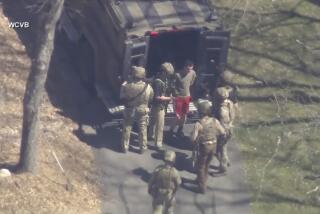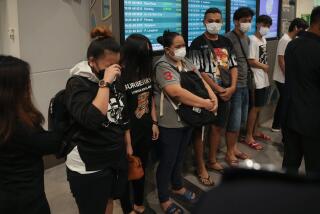Thais Deny Skimming Aid for Guerrillas
- Share via
BANGKOK, Thailand — A U.S. newspaper report alleging that Thai military officers have taken money from a covert aid fund for Cambodian guerrillas has triggered sharp denials by authorities here--and exposed the operation to the public.
Army Commander Chavalit Yongchaiyudh demanded Wednesday that the Washington Post, which published the accusation Sunday, identify the alleged culprits.
“Whoever gave the news should give details,” he insisted. “If they don’t, it’s not right.”
Asked whether the newspaper report could damage the covert program, the army chief responded: “Don’t think like that. That’s why I say (to the Post),’Go to hell.’ ”
U.S. Embassy officials here refused to comment on the charges dealing with what a spokesman called “alleged covert aid.”
The Post article, citing a State Department document and unidentified intelligence sources, said that CIA officers in Thailand turned up evidence last spring that “Thai military officers, and perhaps some businessmen,” had skimmed $3.5 million from the covert fund, which the newspaper report said totaled $12 million in fiscal 1988.
The article said the charges of a skimming scandal “nearly derailed” the secret fund, which it said was established in 1982 or 1983 to provide non-lethal aid to non-Communist factions of the Cambodian resistance. It said the fund was cut to $8 million for the current fiscal year.
While Thai officials denied the skimming charges, the Bangkok press, quoting unidentified government sources, published details of the secret fund, which has never been openly acknowledged by U.S. officials.
Began in Early 1980s
According to the press reports here, the U.S. contribution to the fund began at $5 million a year in the early 1980s and rose to $12 million in fiscal 1988. Singapore and Malaysia, allied with Thailand in the Assn. of Southeast Asian Nations, each put up the equivalent of one-third of the U.S. contribution, the reports said. Singapore reportedly stopped contributing last year, citing financial difficulties.
The aid, ultimately distributed by Thai military officers, according to the press reports, went to the guerrilla armies headed by Prince Norodom Sihanouk and Son Sann, non-Communist leaders of the resistance forces fighting Vietnamese troops and the pro-Hanoi government in Cambodia. In part, the funds were designed to bolster the non-Communist factions in relation to the third member of the resistance, the Chinese-supplied Communist Khmer Rouge. While the aid has been limited to uniforms, radios and other field equipment and some intelligence programs, Sihanouk hinted in Washington last month that some of the money is now being used to supply American weapons.
For the last few years the United States has provided aid to the non-Communist factions in an open program spearheaded by Rep. Stephen J. Solarz (D-N.Y.), chairman of a House subcommittee on Asian affairs. That program, which is also limited to non-lethal aid, has been expanded from $3.5 million to $5 million in current budget proposals.
According to the Post report, which cited a State Department document prepared in July “and made available by a source in the executive branch,” auditors sent to Thailand by the U.S. Senate Intelligence Committee reported back to the panel on “corruption which had been uncovered” in the covert program. The newspaper report said the CIA has since established procedures to assure that the U.S. funds were spent as intended.
Thai officials were stung by this week’s revelations, primarily the leaked document cited in the Post report.
“This is not right,” Ukrit Mongkolnavin, president of the National Assembly, said, “especially so for secret matters affecting national security. Since there is no verifiable evidence, leaking the matter is very damaging to the accused. It should not have been done.”
More to Read
Sign up for Essential California
The most important California stories and recommendations in your inbox every morning.
You may occasionally receive promotional content from the Los Angeles Times.










